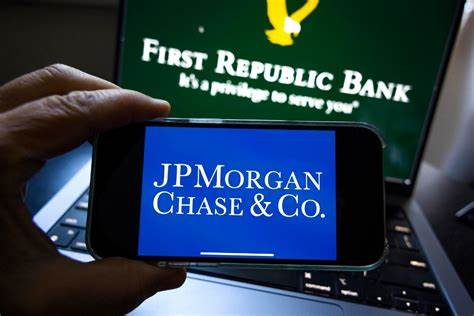Digital Zeitgeist – JP Morgan’s Latest Acquisition: A Game-Changer for the Banking Industry
Regulators seized First Republic Bank and sold its assets to JPMorgan Chase & Co on Monday, in a deal to resolve the largest U.S. bank failure since the 2008 financial crisis and draw a line under a lingering banking turmoil.
In a bold move that could reshape the banking industry, US financial giant JP Morgan announced its plans to acquire most of First Republic Bank, a leading private bank known for its top-tier client base and exceptional customer service. The deal, valued at $25 billion, is set to be one of the largest acquisitions in the financial sector in recent years.
JP Morgan’s move is strategic, as it seeks to expand its wealth management business and gain a foothold in the lucrative market of ultra-high-net-worth clients. First Republic’s high-end private banking services cater to individuals and families with assets exceeding $10 million, offering personalised attention, customized financial solutions, and a range of exclusive perks such as concierge services, access to exclusive events, and even private jets.
Despite these challenges, JP Morgan’s bold and strategic move could have far-reaching implications for the banking industry. The acquisition is expected to close in the fourth quarter of 2023, subject to regulatory approval and other customary closing conditions.
However, in recent years, private banking has become a key growth area for banks, as more individuals and families accumulate wealth and seek specialised financial advice. According to a report by McKinsey & Company, the number of ultra-high-net-worth individuals (UHNWIs), defined as those with assets exceeding $30 million, is expected to grow by 22% over the next five years, reaching over 350,000 worldwide.
This growth presents a significant opportunity for banks, as UHNWIs have complex financial needs that require sophisticated solutions and a high degree of customisation. Private banks offer a range of services, such as investment management, estate planning, tax advice, and philanthropic services, which are tailored to meet the unique needs of each client.
Private banks also differentiate themselves by offering high customer service, which is critical in a business where trust and relationships are paramount. Private bankers build close relationships with their clients, taking the time to understand their goals, values, and preferences, and providing personalised attention and advice.
Private banks have also adapted to the changing preferences of their clients, offering a range of digital solutions and tools that allow clients to access their accounts, track their investments, and communicate with their advisors conveniently and securely.
The Future of Private Banking
The acquisition of First Republic by JP Morgan is likely to have far-reaching implications for the private banking industry. The deal is a sign that the competition for high-end clients is intensifying, as banks seek to expand their wealth management businesses and capture a larger share of the growing ultra-high-net-worth market.
Despite these challenges, the private banking industry is likely to continue growing in the coming years. The number of ultra-high-net-worth individuals is expected to increase significantly, particularly in emerging markets such as China and India. These individuals are looking for sophisticated financial solutions that can help them manage their wealth, preserve their legacies, and achieve their philanthropic goals.
Moreover, the COVID-19 pandemic has accelerated the trend towards digitalisation in the financial industry. Private banks are investing heavily in digital channels and tools, such as mobile apps, online platforms, and artificial intelligence, to enhance the client experience and streamline their operations.
However, what sets this acquisition apart from others is that JP Morgan did not assume any of First Republic’s debt. Instead, the Federal Deposit Insurance Corporation (FDIC) paid off all of First Republic’s debts, which amounted to approximately $5 billion. This is an unusual move, as normally the acquiring bank would assume at least some of the target bank’s liabilities.
The FDIC’s decision to pay off all of First Republic’s debts is significant as it highlights the risks and challenges that exist in the banking industry. It also underscores the role of the FDIC in protecting depositors and maintaining the stability of the banking system.
While the acquisition of First Republic by JP Morgan is seen as a positive development for the private banking industry, the FDIC’s involvement raises questions about the stability and sustainability of the banking system. It also highlights the potential risks and challenges that banks face, including regulatory compliance, economic and financial risks, and cybersecurity threats.
In conclusion, the acquisition of First Republic by JP Morgan and the FDIC’s involvement in paying off its debts is a significant development in the banking industry. While it underscores the importance of personalized, customised solutions in the private banking business, it also highlights the risks and challenges that banks face.
online sources: theguardian.com, reuters.com

